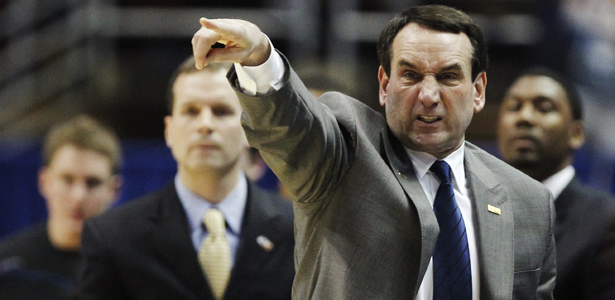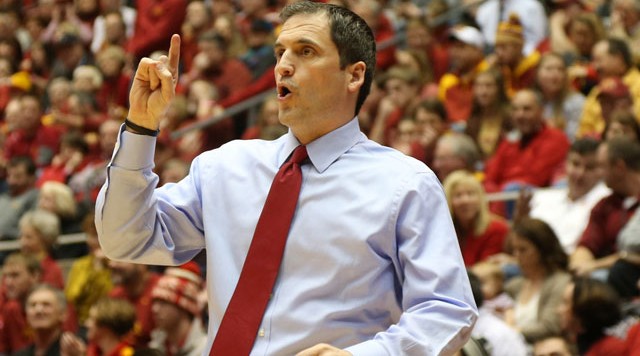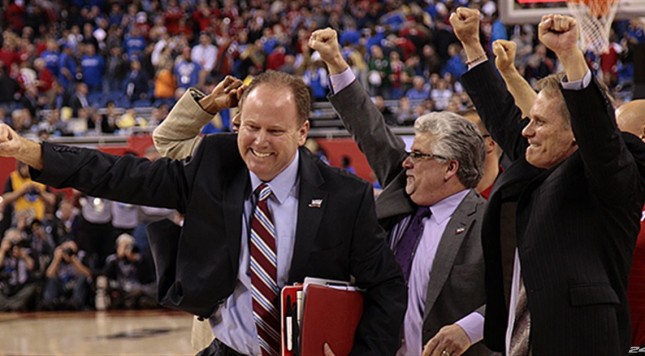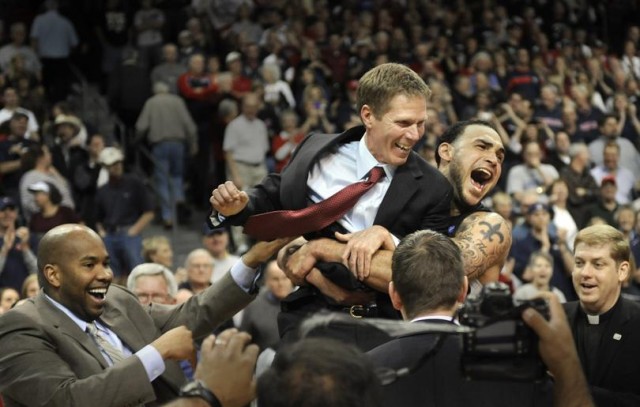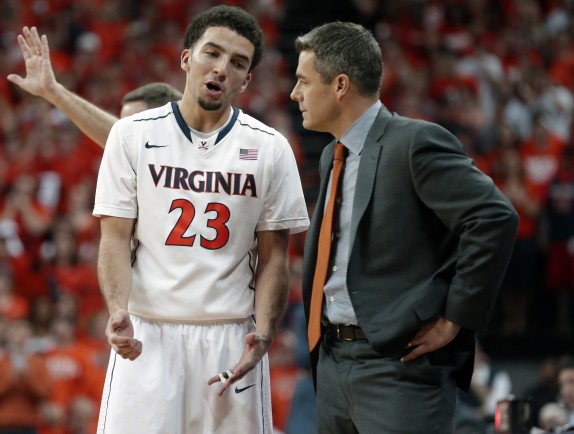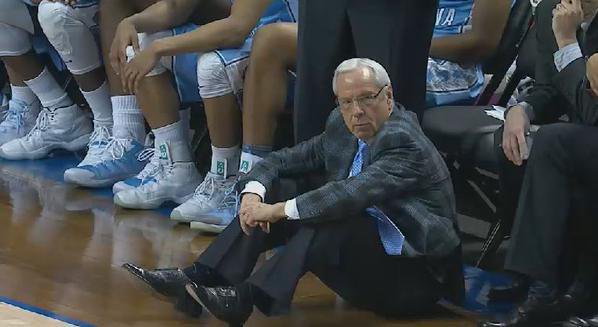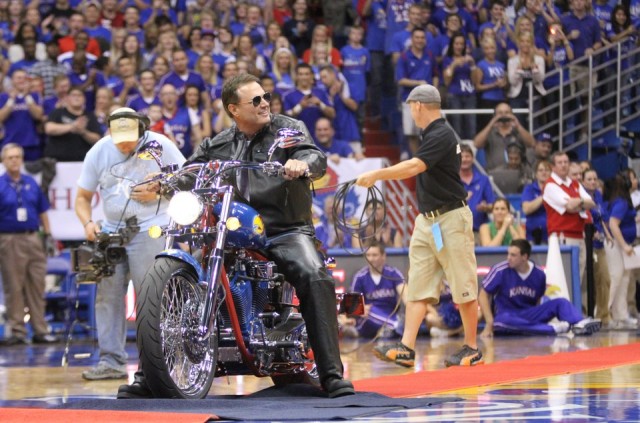The Sweet 16 is set for the 2016 NCAA tournament. How would you rank the 16 coaches left on the Dance floor?
Before anything else, let’s acknowledge that standards will vary for each person. Therefore, before we get started, a few basic ground rules are necessary.
Coaches have histories. Not all of them break through their pasts to forge new reputations, but some do. Some coaches with grand and glorious yesterdays go through dry periods — Dean Smith, for instance, went nine years between Final Fours from 1982 to 1991 at North Carolina. Other coaches without towering career credentials can be ascendant in the present moment.
Therefore, the first ground rule here is that this list will try to give equal weight to history and the present moment. The second ground rule (perhaps just a clarification of the first) is that if the balance between history and the present is relatively even, the tie goes to the coach with more longevity in the profession. That’s hardly a perfect system, but its purpose is to ensure that quality in the past, in the present tense, and over a long period of time are all honored.
Those are the rules. Let’s rank the coaches from 16 to 1.
16. Steve Prohm, Iowa State
There is no bad coach on this list. If Prohm’s the lowest-rated bench boss in the Sweet 16, that’s a superb group.
Prohm won an NCAA tournament game with Murray State before moving to Iowa State last year. It is hard to grade Prohm’s first (and inconsistent) season at Iowa State because of the transition of power itself, but also because of the injury to shooter Naz Long, who would have made this team a lot more dangerous. We might know more about Prohm after this weekend; we’ll definitely know more about him two years from now, when he’s dealing with his own players and not Fred Hoiberg’s guys.
15. Billy Kennedy, Texas A&M
http://gty.im/507158360
Texas A&M was hugely fortunate to make the Sweet 16, as you might have heard. That keeps Kennedy near the bottom of this list. Nevertheless, he’s better than Prohm.
Like Prohm, Kennedy led Murray State to the NCAA tournament. Unlike Prohm, he just led A&M to its first conference championship since 1986. Even though the SEC is a weak conference, Kennedy — who was diagnosed with Parkinson’s weeks before coaching his first game with the Aggies in 2011 — has done quite well in College Station. He gets bonus points for managing his health problems so well. How many of us would have been able to do what Kennedy has done in the four and a half years since that Parkinson’s diagnosis?
14. Mark Turgeon, Maryland
http://gty.im/468531274
Turgeon — again, none of these coaches are bad — falls in the bottom fourth of this list for two reasons: First, Wisconsin whacked Maryland in College Park earlier this season. (See No. 13 on this list.) Second, the Terrapins have underachieved this season. They get a chance to redeem themselves this Thursday against Kansas, but this was supposed to be a Final Four team and a national title contender. Turgeon could not mold Maryland into that kind of force.
Interestingly, much as Prohm and Kennedy both coached at the same school in the past (Murray State), Turgeon coached at Texas A&M before Kennedy did. He made the Big Dance four times with the Aggies, but he made the tourney only once with Wichita State, and now his Maryland career — while certainly in better shape than it was three years ago — exists in a precarious position. He just doesn’t belong higher on this list. This next man, though only in his first season as a head coach, deserves to be ahead of Turgeon:
13. Greg Gard, Wisconsin
The Wisconsin Badgers are nowhere near as talented as the Maryland Terrapins this season. Yet, Gard guided Wisconsin to an authoritative win on Maryland’s home floor, snapping the Terps’ 27-game home winning streak. Wisconsin is in the Sweet 16, alongside Maryland, and actually has a much better chance of advancing to the Elite Eight. Gard might be new to the head coaching business, but after serving time as Bo Ryan’s assistant, he’s already shown his worth. No Big Ten coach did a better job this past season under the circumstances. No, Gard doesn’t possess longevity as a head coach, but he so clearly outrates Turgeon as an X-and-O coach that he gets the nod for No. 13.
12. Tom Crean, Indiana
http://gty.im/513560192
His win over Kentucky was the biggest of his career in Indiana. Yet, Crean still has a lot to prove. He made the Final Four once… with Dwyane Wade and Marquette in 2003. That team also suffered one of the biggest Final Four blowouts of all time (against Roy Williams, whom Crean faces in the Sweet 16 this week).
Crean has since failed to replicate that level of success, and it would not have been unreasonable for Indiana to have fired him after the 2015 season. Yet, he’s here, and after the win over Kentucky, Crean’s going to stay for some time in Bloomington. He’s taken some punches in this business, but he’s still standing. If he beats North Carolina on Friday, his team will be favored to go to the Final Four.
11. Mike Brey, Notre Dame
http://gty.im/507440576
He’s in a very good place at the moment, but Brey isn’t higher on this list because only now, a decade and a half into his career at Notre Dame, has he made consecutive Sweet 16s. He made his first Elite Eight last year. If he can go to the Final Four with what is not one of his best-ever teams in South Bend, Brey will certainly move up this list. For now, he still stays in the back half of the 16-person group.
10. Mark Few, Gonzaga
Few has bookended his lengthy head coaching career in Spokane.
In his first and second seasons (2000 and 2001), Few made the Sweet 16 as a double-digit seed. That’s what Few has done this year, taking Gonzaga full circle. Last season, Gonzaga found itself in a Sweet 16 game against a No. 11 seed. This year, Gonzaga IS the No. 11 seed… but it will be favored to climb past Syracuse and move to Few’s second Elite Eight, the program’s third.
It all sounds very impressive… because it is impressive. Why isn’t Few higher on this list, then? From 2002 through 2014, Gonzaga endured a number of seasons in which the talent on the floor did not translate to a top-4 NCAA tournament seed. The Zags collected a No. 7-10 seed and quietly bowed out of Bracketville on the first weekend of the tournament. They were good for one tournament win in the round of 64, but rarely advanced to the Sweet 16. A full assessment of Few can’t ignore that 13-season period.
9. Lon Kruger, Oklahoma
http://gty.im/510983256
Kruger is one of only two coaches (Tubby Smith is the other) to take five separate schools to the NCAA tournament. Kruger’s signature virtue is that if a program needs repairing, Kruger will indeed fix it. Getting a program to the Final Four? That’s what the especially great coaches do, and Kruger’s done it only once, at Florida in 1994…
He needed A LOT of help to get there.
That season, the Gators needed Donyell Marshall of Connecticut to flinch at the free throw line late in a Sweet 16 game. They also benefited from playing the East Regional in friendly Miami, without top-seeded North Carolina in the mix. Kruger hasn’t gotten back to the Elite Eight since then. (He cracked the Elite Eight one other time, at Kansas State in 1988.)
Kruger is one of college basketball’s great handymen coaches, but high-end achievement has often eluded him.
8. Jim Boeheim, Syracuse
This will rate as a controversial selection to many, but this is where longevity and accumulated accomplishments must be balanced against the present moment and some other measurements.
First of all, even though Boeheim has (ironically) coached two excellent games in this NCAA tournament — both Dayton and Middle Tennessee were thoroughly flummoxed by his signature 2-3 zone — Syracuse did not deserve to get in by most people’s measurements. Even if you disagree with that statement, you will acknowledge that when Syracuse lost an ACC Tournament bubble game to Pittsburgh nearly two weeks ago, the Orange were in huge trouble as far as making the field of 68 was concerned.
Second — and on a larger historical scale — Boeheim has spent 40 years as the head coach at Syracuse. You would think that at least once, he could take a No. 1 seed to the Final Four. Yet, he hasn’t. It’s a staggering gap in his career resume: Boeheim has never taken Syracuse to the Final Four as a 1 seed. He fell short in 2012. He couldn’t do so in 2010. He couldn’t turn the trick back in 1980… and hey, wait a minute: How come Syracuse hasn’t been a 1 seed more often in the course of 40 years?
Yes, Boeheim is a Hall of Famer. Yes, he deserves to be seen as thought of as a great coach. Those labels cannot and should not be taken away from him. Yet, among the great coaches of our time — especially those in the Hall of Fame — Boeheim sits in the back rows, not the front seats.
7. Jay Wright, Villanova
http://gty.im/506089530
Wright offers a fascinating comparison to Boeheim in that while he has just one Final Four appearance, he has made Villanova a No. 1 seed twice in the past 11 seasons and a top-2 seed in each of the past three seasons. If judged solely on the basis of regular season results and performance, Wright might be the second-best coach in college basketball over the past three seasons behind Bill Self of Kansas. Tony Bennett of Virginia would also have a claim in that conversation.
Wright does consistently great work. March, though, has been a thorn in his side. Like a number of other coaches on this list, a Final Four run would instantly — and sharply — improve the way he’s perceived on a national level (whether that’s fair or not).
6. Jim Larranaga, Miami
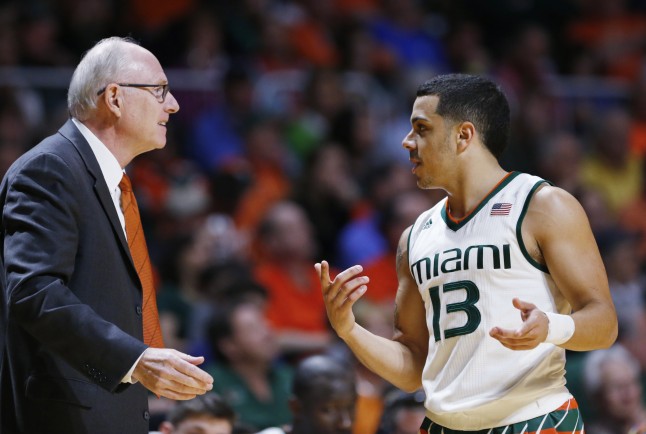
The man who will oppose Wright in the Sweet 16 this week has only one Final Four to his credit, so why is he this high on the list? Very simply, “Mr. Tilde” has not taken any old-money jobs at the top of college basketball’s power structure. If he coached at, say, Louisville or Maryland or Georgetown, he’d win on a large(r) scale.
George Mason was one of the little guys in college basketball, but Larranaga took the Patriots to the Promised Land in 2006, a feat which opened the door for Butler and VCU a few years later. That’s one of the signature accomplishments in modern college basketball coaching.
Now, Larranaga has taken a historically barren Miami program to two Sweet 16s in four seasons. That’s not uncommonly good work; it’s uncommonly great work. Give me Larranaga over Wright and the other coaches previously mentioned on this list if I want to win one game tomorrow, be it in a 20,000-seat arena, a church gym, or a parking lot.
5. Dana Altman, Oregon
http://gty.im/163846581
This is a case in which the present moment outweighs career achievements. Altman certainly did well at Creighton, thriving in the realm of the mid-majors. He’s certainly worked wonders at Oregon, doing things no Duck coach has done before. This very much includes the elevation of the Ducks to a No. 1 seed. Yet, Altman hasn’t yet made a single Elite Eight, let alone a Final Four. He’s really this high?
Yes, he is. He’s my 2016 Coach of the Year.
Altman has transformed the Oregon program, but more specifically, he’s taken this team to the Sweet 16 with a No. 1 seed all while Villanova transfer Dylan Ennis has been sitting out with an injury. UO hasn’t merely thrived; it has done so under less-than-ideal circumstances. Altman’s a wizard, and as soon as he makes just one Final Four (a big if, but well within his reach), he’s going to be thought of as a star.
Had he not flip-flopped when he initially agreed to become Arkansas’ head coach in 2007, the course of the Razorback program and SEC basketball as a whole might have been very different.
4. Tony Bennett, Virginia
Bennett has never made an Elite Eight, just like Altman. He’s another vote for the power of the present moment. For one thing, Virginia has been unfairly dumped on by college basketball bloggers the past two seasons. What many perceived as “Virginia not being good enough to make the Final Four” has really been nothing more than “facing Tom Izzo in March.” Yes, Virginia must now take advantage of the favorable path it has in the Midwest Regional, but assuming the Cavaliers do just that, Bennett will take his rightful place as a genuine star in the coaching profession.
Remember this about the man who has turned Virginia into an ACC Tournament champion (2014) and a top-2 national seed in each of the past three seasons: He took Washington State (!) to the Sweet 16.
If you can do that, you are better than 99.9 percent of your peers.
3. Roy Williams, North Carolina
Roy Williams is not an unquestioned superstar in college basketball coaching… because he’s questioned far more often than he should be.
Yet, he’s finished first in the ACC in a majority of his 13 seasons in Chapel Hill (including this one). He’s won two national titles at North Carolina, and very possibly would have won a third if Kendall Marshall hadn’t gotten injured in the 2012 NCAA Tournament. He’s made seven Final Fours in his career, including four national title games. He’s never, ever lost a round-of-64 game in the NCAA tournament.
So he’s not as good as Coach K, Bill Self, Rick Pitino, Tom Izzo, or John Calipari. You won’t get an argument here.
Just realize that he’s better than everyone else.
2. Bill Self, Kansas
The penchant for March losses is something which exists for almost every coach. Even Tom Izzo could not avoid a 15-2 upset against Middle Tennessee. Self simply collects a few more March blemishes than most of his contemporaries. There’s no denying that. People might remember Northern Iowa and Ali Farokhmanesh in 2010, but the 2011 loss to VCU strikes me as a much more acute failure, a game the Jayhawks never should have lost (but did, because they shot too many threes).
Nevertheless, the greatest coaches among us all lose a few particularly painful games in March. Dean Smith, Roy Williams, Jim Boeheim, Lute Olson, Rick Pitino, John Calipari — they’ve all felt the sting.
Can Self honestly be placed this high on the list? If coaching isn’t reduced to one week or one game in March, he should be.
It’s not complicated: 12 straight Big 12 titles at Kansas is a remarkable streak which will only grow in stature the longer it isn’t broken. It will become the kind of streak which only Kentucky (in the weak SEC) might ever have a chance to reach in the Power 5 conferences over time.
Bill Self, in the course of a regular season, always finds answers to his teams’ problems. Even in his first rough season at Kansas, he fixed things in the NCAA tournament to the point that the Jayhawks reached the Elite Eight. He also took Tulsa and Illinois to the Elite Eight. He is a truly phenomenal coach. In many ways, he’s Roy Williams all over again at Kansas — he should make a few more Final Fours, but man, the relentless accumulation of excellent regular seasons is breathtaking.
1. Mike Krzyzewski, Duke
http://gty.im/512862436
He is the greatest college basketball coach next to John Wooden. That the claim is virtually impossible to dispute is what makes Coach K the towering figure he is in college basketball. Five national titles, 12 Final Fours — including five straight (1988-1992) — 13 ACC Tournament titles, 12 first-place finishes in the ACC regular season? Come on.
None of this includes the two Olympic gold medals and the two FIBA Basketball World Cup golds.
Coach K’s success with collegians and pros alike offers more than enough evidence to support the claim that he is the greatest coach in modern American basketball — modern basketball defined as “since the adoption of the three-point line in the NBA (1979) and college (1986).”
If you wanted to argue that Phil Jackson is better, you’d certainly have a case. Krzyzewski, for my money, is better.

